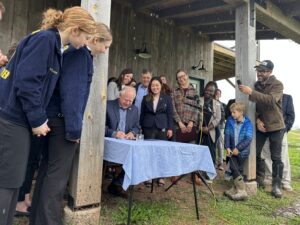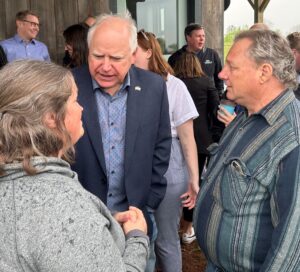Legislative Update: Five days to go in session 2023
Just days remain for state lawmakers to wrap up their work on a state budget by the session’s constitutional adjournment date on Monday, May 22. House leadership had previously shared their goal of ending session early—on Thursday, May 18—a proposition that seems increasingly unlikely. That said, lawmakers have continued to work late into each night, closing deals on massive omnibus bills that will shape state government going forward.
Two critical pieces of the state budget are still being negotiated: healthcare and taxes.
First on healthcare, MFU has continued to advocate for expanding Minnesota’s successful MinnesotaCare program with a public option, allowing farmers and other small business owners to ‘buy-in’ to the coverage provided to lower-income Minnesotans. Now many years after this idea was first proposed by then Gov. Mark Dayton and after much advocacy from MFU members, this proposal was included in Gov. Walz’s budget request as well as both the Senate and House omnibus bills.
As proposed, Minnesotans who ‘buy-in’ would pay a sliding scale premium based on their income. Much like MinnesotaCare, those participating would benefit from high quality coverage and low out-of-pocket costs. Premiums would be set to by state agencies in order to pay for the program and adequately reimburse providers. The specific details of this proposal depend on a federal waiver and the complicated actuarial analysis needed to set up a first-of-its-kind program. Both of these push the implementation date for this policy out to at least 2027.
At the Capitol, MFU is working hard to ensure that the deal agreed to by Chairs Melissa Wiklund, DFL-Bloomington, and Tina Liebling, DFL-Rochester, is strong and sets a clear path for implementation.
Also still in play is legislation that would provide greater oversight of large hospital mergers. The bill (HF402) passed the House last week and completed its committee stops in the Senate receiving the approval of the Senate Judiciary and Public Safety Committee and the Senate Finance Committee. If passed, Minnesota would have some of the strongest hospital merger oversight in the nation.
Last for healthcare, the Senate passed the final omnibus commerce bill (SF2744) last night, which includes the establishment of a Prescription Drug Affordability Board (PDAB), something MFU advocated for throughout session and the top recommendation from the Attorney General’s task force on drug prices. The board would have the authority to set upper payment limits on certain high-cost drugs.
This commerce omnibus bill still needs to pass the House and continues to face stiff opposition from the pharmaceutical industry’s trade group, PhRMA.
The package also includes Right to Repair legislation, which MFU has worked on for many years. Unfortunately, ag equipment was stripped out of the bill due to concerns in the Senate early in session and was not added back in conference (for more encouraging news on that issue look to Colorado).
Tax chairs trade offers
Second on taxes, Chairs Anne Rest, DFL-New Hope, and Aisha Gomez, DFL-Minneapolis, have been meeting to trade offers that bring their respective proposals closer to a final deal. As of Wednesday morning, the chairs are aligned on funding the Beginning Farmer Tax Credit at $4 million per year and Soil and Water Conservation District (SWCD) aid at $15 million per year. The Senate is alone in retaining the ag homestead first tier valuation increase to $3.5 million and making an important fix for county fairs.
You can view a spreadsheet that outlines their respective offers here and read about MFU’s priorities in the tax bill here. Staff and chairs have continued to meet outside of the hearing and a final deal could be released today.
Environment and energy bill released
Late Tuesday night a deal on environment and energy was released by Chairs Sen. Foung Hawj, DFL-St. Paul; Rep. Rick Hansen, DFL-South St. Paul; Sen. Nick Frentz, DFL-Mankato, and Rep. Patty Acomb, DFL-Minnetonka. The final package includes an additional $21 million for soil health financial and technical assistance that promotes “water quality, soil productivity, climate change resiliency, or carbon sequestration.” The program will be implemented by the Board of Water and Soil Resources (BWSR) who will work in partnership with MDA and engage with local partners.
The final environment package also includes $7 million to pilot a green fertilizer production incentive, something MFU has worked hard on and that Energy Chair Nick Frentz has championed throughout session. The proposal would provide grants of up to $7 million to farmer-owned cooperatives to purchase equity in fertilizer produced with hydrogen. This builds on work from the University of Minnesota Morris and leverages the federal hydrogen tax credit.
As described by Senate author, Aric Putnam, the current situation isn’t working well for farmers. Globally, the production of nitrogen fertilizer produced through burning natural gas and coal contributes 2 percent to emissions. Not only that, but it’s largely produced oversees, shipping wealth out of Minnesota and to four multinational companies that dominate 75 percent of the fertilizer market.
In an early hearing on the topic, MFU Vice President Anne Schwagerl helped make the case that—from a resiliency perspective—it’s valuable to have fertilizer production in our backyard. And for rural development, farmers should benefit from scaling this technology, not the same multinational companies who dominate the market today. We’re looking forward to learning from this pilot and building on its success in the years to come.
Finally, the final environment and energy omnibus bill (HF2310) also includes versions of House positions related to treated seeds. The bill would prohibit disposal of treated seed by a drinking water source, through composting, or via incineration at home. It would also require the state to undergo rulemaking to provide additional regulations related to disposal and to educate farmers and others about safe handling.
Agriculture bill signing

Gov. Tim Walz signs the ag bill on May 18 at Medicine Creek Farm near Finlayson.
The agriculture bill passed and Gov. Tim Walz will hold a ceremonial bill signing yet this week. Some provisions—like protection from the grain indemnity fund—will go into effect at the start of the new fiscal year on July 1. Other programs—like MDA’s new cooperative development grants or scholarships for meat processing students—will take time for agency staff to design and promote, becoming available to farmers and others in the months to come.

Gov. Tim Walz talks to Lisa and Martin Phillips after signing the ag bill on May 18 at Medicine Creek Farm.
For an in depth review of agriculture bill, see last week’s e-news here. In short, the deal negotiated between Chair Aric Putnam, DFL-St. Cloud, Chair Samantha Vang, DFL-Brooklyn Center, and the Walz administration represented by Commissioner Thom Petersen increases the ag budget by $48 million over the next biennium. This new funding includes an array of MFU priorities including starting the grain indemnity fund, expanding local meat processing, supporting new farmers, investing in soil health, funding cooperative development grants, biofuels infrastructure and grants for dairy farmers.
“This bill invests in the foundation of Minnesota’s economy – family farm agriculture – while looking to the future with its support of beginning and emerging farmers,” said MFU President Gary Wertish in a release following the bill’s passage. “It establishes a grain indemnity fund, which MFU has worked on since the Porter elevator failure in 2015, and it expands investments in meat processing, a priority of MFU members since the pandemic laid bare the inadequacies in our food supply chain.”
Bonding proposal released
On competition, the State Government and Elections Conference Committee adopted increased funding for the Attorney General’s office. A funding increase for that office will enable them to hire additional staff including antitrust attorneys, create a multistate litigation fund and enhance antitrust oversight. MFU worked with a variety of our antimonopoly working group members to submit a sign-on letter urging the committee to adopt this strong funding package.
You can find an updated list of proposed bonding projects here. And learn more about Farmers Union’s work on the 2023 Farm Bill by signing up for National Farmers Union’s email updates here.
As always, this is just a snapshot of MFU’s work at the capitol. If you have questions, thoughts or concerns, please reach out at stu@mfu.org or (320) 232-3047 (C).
